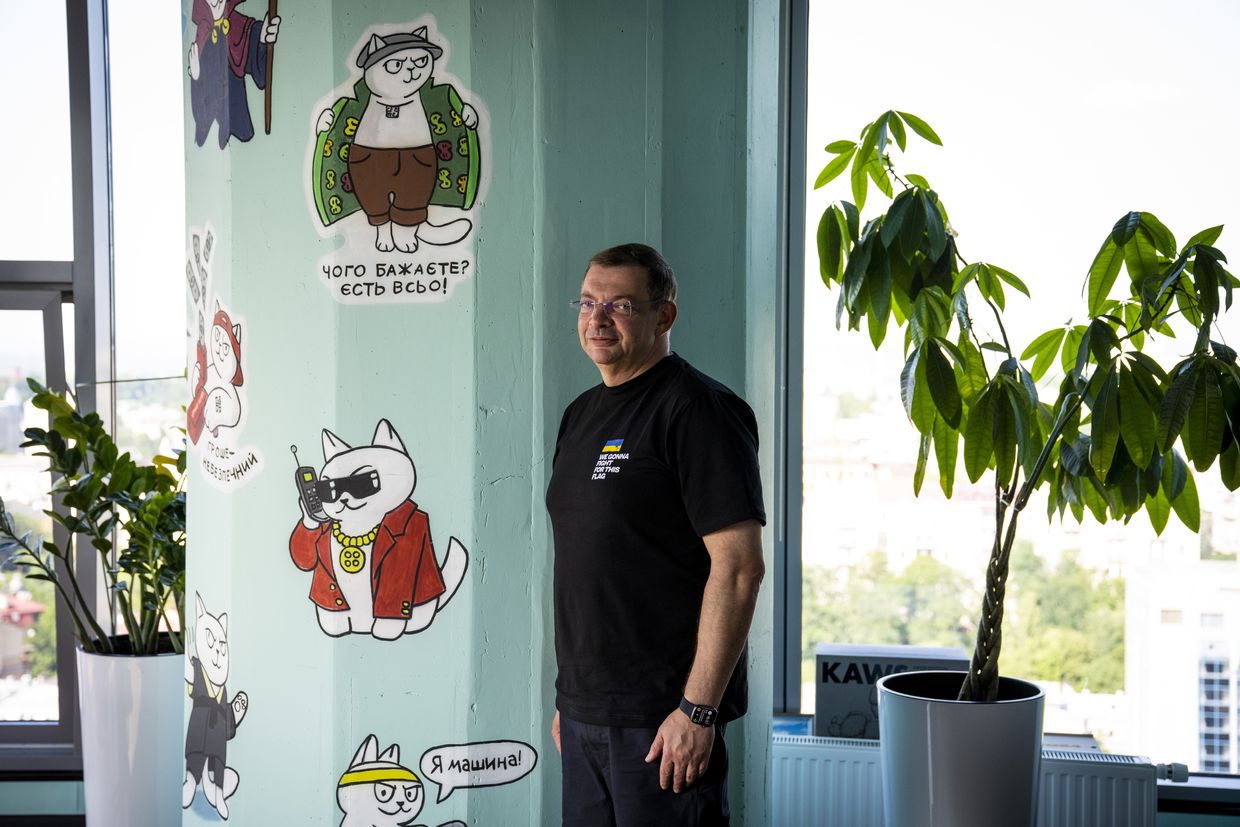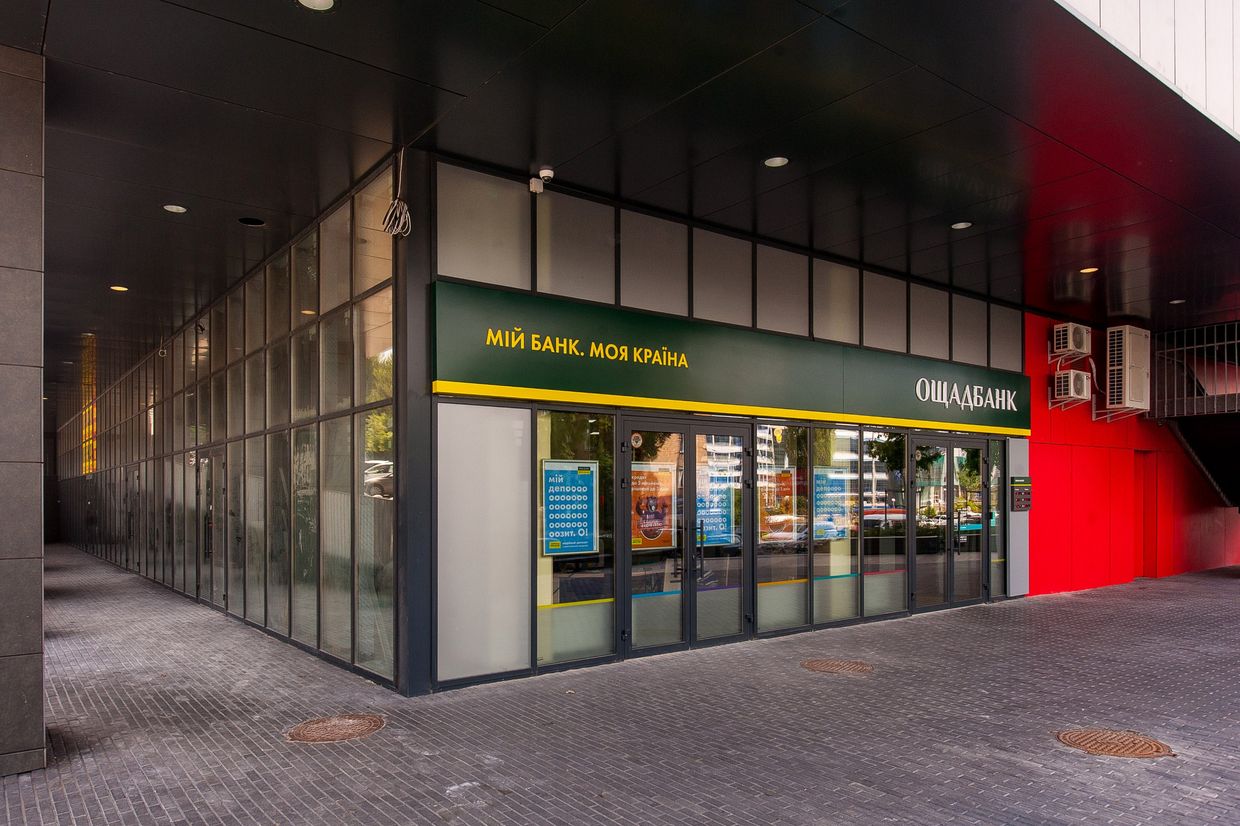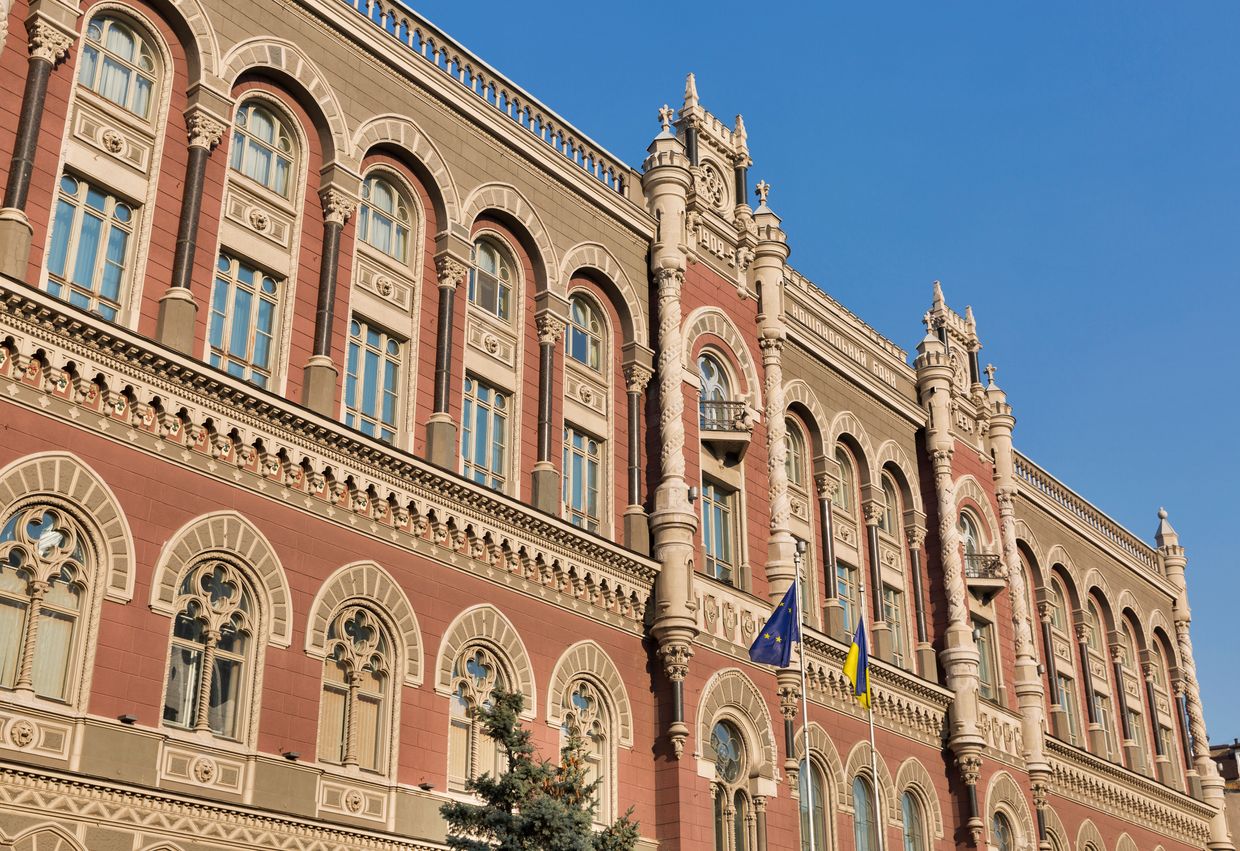‘Not a stroke of luck:’ CEO of Ukrsibbank BNP Paribas Group on continuing operations during Russia’s war

People wait at the entrance to a Ukrsibbank bank branch in central Lviv, Ukraine, on Feb. 28, 2022. (Ethan Swope/Bloomberg via Getty Images)
Laurent Dupuch has weathered not one but two storms over the past few years as CEO and country manager of one of Ukraine’s largest banks Ukrsibbank.
He arrived in Ukraine after almost seven years as CEO of the bank’s Morocco operations at the beginning of March 2020, right at the start of the Covid-19 pandemic. He stayed in Ukraine after the full-scale invasion began in 2022.
According to Dupuch, it was the experience managing the bank during the pandemic that helped him to keep serving Ukrsibbank’s 2 million customers during Russia’s war.
Ukrsibbank, a subsidiary of the French BNP Paribas bank, is Ukraine’s second-largest among foreign banks in the country after the Austrian Raiffeisen Bank. It’s the 7th largest bank among all Ukrainian banks.
The bank never stopped banking operations after Russia invaded. It currently operates more than 200 branches and more than 700 ATMs and ensures the uninterrupted operation of all its programs and digital services.
Dupuch told the Kyiv Independent that keeping the bank running “was not a stroke of luck, but a result of our concerted efforts to get even closer to our customers.”
“By understanding our customers' evolving needs, we were able to develop solutions that effectively supported them throughout this challenging period,” he said.
In a conversation with the Kyiv Independent, Dupuch discussed how the bank has navigated the war in Ukraine and its plans for the future, as well as his insights on leadership, the business climate in Ukraine, and the country's path to the EU.
This interview has been edited and shortened for clarity.
The Kyiv Independent: How has the bank navigated these two years of full-scale war?
Laurent Dupuch: It's been a challenging time but also a time of remarkable progress. We took a moment to reflect and appreciate how the bank and our teams adapted and grew during this period.
Over the past two years, our bank has not only maintained operations but also excelled. We've stood as a robust and reliable presence for our 2 million customers, a testament to our resilience and commitment. This was not a stroke of luck, but a result of our concerted efforts to get even closer to our customers. We expanded our branch network, harnessed the power of the banking network led by the National Bank of Ukraine, and prioritized digital innovation through our app. By understanding our customers' evolving needs, we were able to develop solutions that effectively supported them throughout this challenging period.
The Kyiv Independent: How have the needs of clients changed over the last two years?
Laurent Dupuch: The war initially shocked the entire economy, forcing individuals and businesses to reassess their needs and priorities. In response, we've launched new digital offerings for individuals, private entrepreneurs, and middle and large businesses. These include future-oriented services for individuals, a new digital app for entrepreneurs, and online onboarding for corporate businesses.
Importantly, we've seen a renewed demand for lending. Enterprises are looking to restart and sustain their operations as the situation stabilizes.
The Kyiv Independent: Many entrepreneurs and foreign companies now look to the plans of major businesses to forecast their development this year. How do you plan this year?
Laurent Dupuch: In 2024, our primary goals remain unchanged – ensuring customer satisfaction and maintaining the bank's smooth operation.
But we're not resting on our laurels. We're investing a significant portion of our resources (€30 million annually) to transform the bank. This transformation will involve streamlining processes, and enhancing our physical branches and digital platforms, and continuing our agile approach to innovation.
What does that mean? Well, a few things. First, we're making things run more efficiently by streamlining processes and using all this tech we have. Second, we're improving both our physical branches and our digital platforms to give you, the customer, more options for how you want to bank with us. Third, we're staying nimble and innovative by continuing our agile approach, which means getting new products and services to you faster.
We want to grow our customer base, too. We'll use some targeted strategies based on what worked well last year to bring in new people.
Looking ahead to the post-war future, we're actively securing resources to support Ukraine's reconstruction efforts. This includes €15 million loan agreement with the EBRD to bolster lending to SMEs. We're also in the process of pursuing additional agreements with international financial institutions.
Furthermore, we're collaborating with BNP Paribas to inform international investors about Ukraine's situation and potential opportunities to encourage continued investment in the country.
We’re also continuing our bank's transformation to enhance efficiency and achieve a high customer Net Promoter Score (NPS).

The Kyiv Independent: How do you assess Ukraine's path to the EU?
Laurent Dupuch: For me, the journey of progress and reform is more important than a specific EU accession date. This robust movement towards reform is truly impressive, especially considering the ongoing war.
Ukraine's progress with the IMF's four-year plan and sustained macro-financial stability are commendable. Strong leadership from the National Bank, authorities, and international support are all crucial elements. However, Ukraine's resilience, adaptability, and decisive actions – even if difficult – demonstrate its strength.
Ukraine has proven itself a brave and committed nation, ready to face challenges and pursue a clear vision. The EU roadmap is a powerful beacon for Ukraine's future, and we, as an international bank active in the country, are committed to accompanying and supporting it on this journey.
The Kyiv Independent: So, you're the CEO. What advice do you have for Ukrainian entrepreneurs and international companies planning to invest in Ukraine?
Laurent Dupuch: Let's start with Ukrainian entrepreneurs. They're the backbone of this country, and we're in constant contact with them. They know, just like us, that they need to keep their businesses going. This is vital for Ukraine's economy.
There are two main ways to help: protect your country or work and pay taxes. Every bit counts. So, businesses should keep operating as usual as possible under the circumstances. They must keep providing the goods and services people need and pay taxes to keep the government running. We're here to support them in any way we can.
The Kyiv Independent: Now, what about international companies? How can they get involved?
Laurent Dupuch: This is where things get interesting. Ukraine will need a lot of support rebuilding after the war, and that's where international companies come in. We proactively engage with global companies to explore investment opportunities in Ukraine. We want to be a partner in the country's reconstruction efforts and are actively collaborating with various partners to secure financing for the country's rebuilding.
We at Ukrsibbank want to make sure Ukraine stays on these companies' radars.
The Kyiv Independent: On the radar? How do you do that?
Laurent Dupuch: Our main shareholder BNP Paribas has a massive network – a leading European bank, a strong presence in the U.S. and Asia… So we at Ukrsibbank use that network to connect international businesses with Ukrainian companies. We organize meetings, both online and in person, to keep everyone informed about the situation here. We want them to understand Ukraine's incredible resilience. People are standing up for Ukraine’s independence, but life goes on, and the economy is actually recovering. The GDP is even growing again.
That's why we tell international companies, "Look, you don't have to come rushing in now. But start planning and talking to Ukrainian businesses. Explore potential projects and investments. Because by the time the war would be over ."
It's a two-step approach: keep Ukraine in mind now, and be ready to jump in when the time is right.
The Kyiv Independent: How do you assess the current business climate in Ukraine?
Laurent Dupuch: It's a challenging question. War and business climate don't typically go hand in hand. But here's a different way to look at it. Despite the war, there are signs of a positive trend in the business climate. First, a solid commitment to reforms is needed for Ukraine to join the EU, and the government is committed. The IMF partnership is also a positive sign.
Second, there's a vision. There's a clear vision for the future, and authorities are taking pragmatic steps to ease regulations when possible. This provides a roadmap for businesses. Businesses have adapted their models, and economic activity is recovering. The population's needs are still there, and people are finding ways to operate.
Of course, it's not all sunshine and roses. The war makes things very difficult. Sometimes, we need to make difficult decisions to protect a country's major interests. There's also this new mobilization law, because it has quite a big impact today on the business climate and businesses need clarity on how it works so they can plan.
The Kyiv Independent: What do businesses need most right now?
Laurent Dupuch: Clear rules. Even in wartime, knowing the regulations allows businesses to adapt. Businesses need a long-term vision, and we also need a vision for long-term investments. They also need the government to keep pushing these reforms, like focusing on further simplification, digitalization, and the fight against corruption. It will improve the overall business environment, making Ukraine more attractive to investors in the long run.
The Kyiv Independent: We all had ideas about leadership before the war, but how has your perspective changed?
Laurent Dupuch: Maybe this war didn't redefine leadership, but it certainly tested it in a big way. There's a lot of talk about leadership qualities, but here in Ukraine, we've seen real leadership put to the test, from our national leaders to everyday people.
It's about courage. A leader has to make tough decisions, even unpopular ones, for the greater good. And Ukraine, the country, the people, the businesses, everyone has shown incredible courage.
Trust is also crucial. You need confidence in your team, your family, and your surroundings. The unity and trust that emerged since the invasion have been amazing. People put aside their differences and came together. This solidarity is true in families, communities, businesses, and everywhere.
Finally, leadership is about adaptability, the ability to be agile, react quickly, and make decisions without hesitation. It's better to make a decision, even if it's not perfect than to be paralyzed by overthinking. We can constantly adjust and improve later. That's the key.
Ukraine and Ukrainians have shown all these qualities in spades. How everyone adapted and rallied since the war began on February 24th, 2022, has been truly impressive. It happened in minutes, not days or weeks.

The Kyiv Independent: Since the war began, many of your employees have joined the armed forces. How have you supported them?
Laurent Dupuch: Yes, around 100 of our colleagues have mobilized. Our immediate decision was to continue supporting them their families in various ways. We pay their salaries, ensure they receive everything they need, and stay in touch with them. This connection is essential – they need to feel like part of the bank’s family.
The Kyiv Independent: How about when they return?
Laurent Dupuch: Some have already returned, and we're helping them with rehabilitation programs. We also launched the “We’re Proud” program to integrate society to veterans. It's multifaceted. First, we support returning employees through health programs, social support, etc. We also train our staff on interacting with veterans. We want everyone to feel comfortable and prepared. Of course, we're adapting work conditions and jobs for veterans. But “We’re Proud” goes beyond existing employees. This program is for both our mobilized colleagues and potential candidates, and consists of four main components: onboarding, inclusive culture and environment, health support, including mental.













